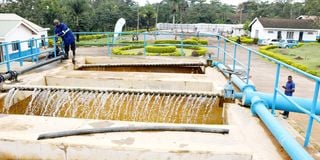Pollution of R. Mpanga increases water treatment cost

A worker at NWSC Fort Portal branch backwashes a water treatment plant on September 16, 2022. PHOTO | ALEX ASHABA
National Water and Sewerage Corporation officials at Fort Portal branch have expressed concern over the increasing operational costs in treating water from River Mpanga.
The Fort Portal branch manager, Mr Denis Muramuzi, said the river is mainly polluted by human activities.
“Previously, we had two water treatment units but due to pollution, we were forced to build another treatment plant at a cost of Shs3b,” he said last Friday.
Mr Muramuzi said water pollution is always high during the rainy season which affects the water quality.
“During the rainy season, we only get sand from the river into our water treatment plants and sometimes we are forced to close the treatment plant,” he said.
Mr Muramuzi added that during the rainy season, they need to backwash the water treatment unit more than three times a day which consumes a lot of electricity, adding that they spend Shs100m in monthly electricity bills.
Mr Muramuzi said they buy 40 tonnes of sand annually from Entebbe to use in water treatment.
The senior quality officer at Fort Portal branch, Mr John Onencan, said between August to November, the cost of operation on treatment of water doubled from Shs22m to Shs40 million.
Officials said during the rainy season, they use four tins of chlorine every week but use three in dry season. Each tin is 45 kilogrammes.
The team leader at the water and sanitation regional centre 5 in the Ministry of Water and Environment, Mr Sam Tusiime, said the pollution is largely due to poor land use practices.
“Many people don’t have pit-latrines and our water treatment plants are always polluted by dirt. We have recommended that people should stop staying in buffer zones,” Mr Tusiime said.
The city’s senior environment officer, Ms Gladys Natugonza Mirembe, said they have started demolishing illegal structures on the river banks to protect it from pollution.
“All those people who don’t have river banks user permits, their structures on the River Mpanga have been demolished, we are continuing to give others notices so that they can stop their activities,” she said.
Mr Muramuzi said they are now partnering with city leaders and NGOs to continue planting trees on the river banks.




